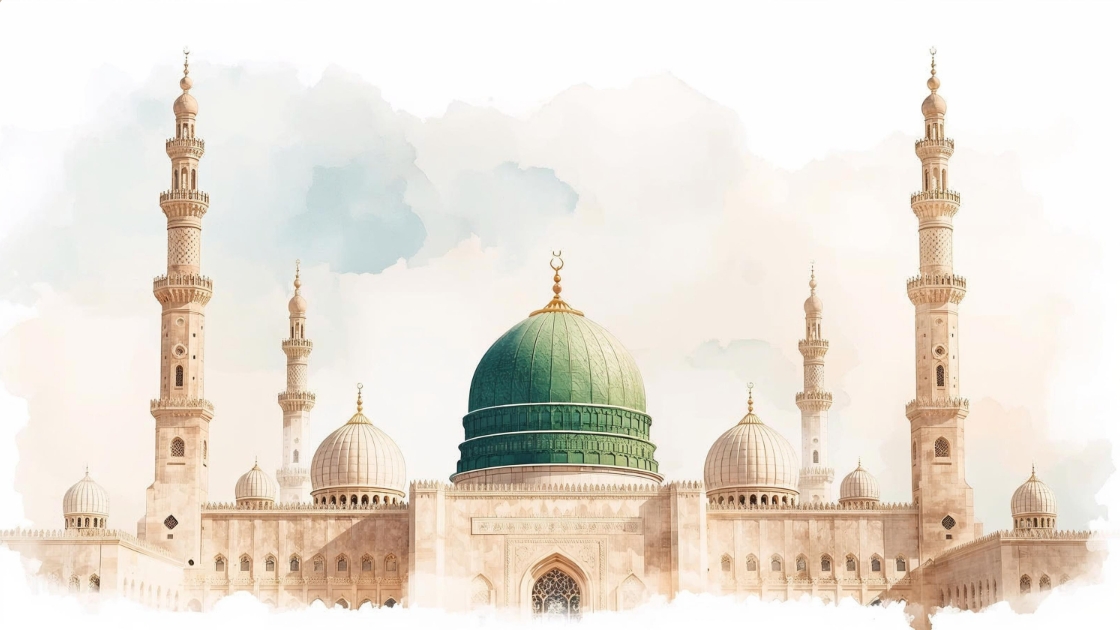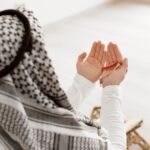Allah ﷻ says in the Holy Quran about Duas:
وَقَالَ رَبُّكُمُ ادْعُونِي أَسْتَجِبْ لَكُمْ
“And your Lord says, ‘Call upon Me; I will respond to you.’” – 40:60
The verse shows that Muslims make Duas only to Allah SWT. This is the basic principle of Islam that you should call upon Allah ﷻ in every situation. Through Dua, a Muslim expresses his weakness and acknowledges the power and mercy of Allah ﷻ. Since Dua is a soulful conversation that a person makes with Allah ﷻ alone. It’s a sign of faith, belief, and trust.
Muslims make Duas in their daily lives to Allah ﷻ and even when they go on Umrah. Umrah is a worship that is performed inside Masjid al-Haram in Makkah. During this worship, pilgrims recite prayers and recite some special Duas, which are often called Umrah Duas.
By the way, your Umrah is completed in Makkah, and the Umrah Duas do not only mean that you have to perform them only in this city. You also go to Madinah on your Umrah trip. Madinah is the holiest city in Islam and is sometimes also known as the “City of the Prophet Muhammad ﷺ”. Here is the green dome inside the Masjid an-Nabawi.
The primary purpose of visiting Madinah for Umrah pilgrims is only the Masjid an-Nabawi. This is a blessed place for pilgrims, and the Duas recited here are accepted. This is what we are going to learn here: the essential Duas to recite in Masjid an-Nabawi during the Umrah trip.
Dua When Entering the Masjid an-Nabawi
When you reach Masjid an-Nabawi, you should recite the following Dua. Actually, it’s a Sunnah Dua to recite when entering a holy Mosque.
بِسْمِ اللَّهِ، وَالصَّلَاةُ وَالسَّلَامُ عَلَى رَسُولِ اللَّهِ، اللَّهُمَّ افْتَحْ لِي أَبْوَابَ رَحْمَتِكَ
“In the name of Allah, and peace and blessings be upon the Messenger of Allah. O Allah, open for me the doors of Your mercy.”
In addition, the specialty of Masjid an-Nabawi is that the reward for worship and prayers offered here is much greater than in ordinary Mosques. Let’s prove this from a Hadith!
Abu Hurairah (رضي الله عنه) narrates that Prophet Muhammad ﷺ said:
“One prayer in this Mosque of mine is superior to a thousand prayers in other Mosques, except for Masjid al-Haram.” – Sahih Muslim: 1394a
As we are talking about the entrance at Masjid an-Nabawi, you should follow some etiquette and manners. So, when entering, follow the Sunnah by using your right foot and then recite the Dua given above. If possible, offer two Rak’ah Nafl prayers (Tahiyyat al-Masjid) once entered.
Dua for Paying Salutations to Roza-e-Rasool (The Prophet’s ﷺ Tomb)
Roza-e-Rasool is the Prophet Muhammad’s ﷺ grave. Along with Prophet’s ﷺ grave, Abu Bakr (رضي الله عنه) and Umar Ibn al-Khattab (رضي الله عنه) are also buried. For the Muslim Ummah, this place is one of the most sacred places in the world, after Masjid al-Haram. Paying salutations to Prophet Muhammad ﷺ is necessary for every Muslim, as Allah ﷻ said in the Quran:
إِنَّ اللَّهَ وَمَلَائِكَتَهُ يُصَلُّونَ عَلَى النَّبِيِّ يَا أَيُّهَا الَّذِينَ آمَنُوا صَلُّواعَلَيْهِ وَسَلِّمُوا تَسْلِيمًا
“Indeed, Allah and His angels send blessings upon the Prophet. O you who have believed, send blessings upon Him and greet Him with peace and abundance.” – 33:56
When an Umrah pilgrim goes to Roza-e-Rasool, he actually obeys this Quranic order. Pilgrims can recite this salutation:
السَّلَامُ عَلَيْكَ يَا رَسُولَ اللَّهِ
“Peace be upon you, O Messenger of Allah.”
OR
السَّلَامُ عَلَيْكَ يَا نَبِيَّ اللَّهِ وَرَحْمَةُ اللَّهِ وَبَرَكَاتُهُ
“Peace be upon you, O Prophet of Allah, with the mercy of Allah and His blessings.”
Some Muslims also recite this Dua:
اَلسَّلَامُ عَلَيْكَ أَيُّهَا النَّبِيُّ وَرَحْمَةُ اللهِ وَبَرَكَاتُهُ، جَزَاكَ اللهُ عَنَّا يَا رَسُولَ اللهِ خَيْرَ مَا جَزَى نَبِيًّا عَنْ أُمَّتِهِ
You should recite these Duas in front of Roza-e-Rasool by standing with respect. Keep your voice low and don’t arguments with others, it’s against the Masjid an-Nabawi’s regulations. The Quran also says not to raise voice above the Prophet’s ﷺ grave (Surah al-Hujurat: 2).
Once you recite this Salam, you can also offer salutations to the Prophet’s ﷺ companions, Abu Bakr (رضي الله عنه) and Umar Ibn al-Khattab (رضي الله عنه). Keep in mind that the purpose of Salam is not to seek any help or ask for anything from the graves, but it’s only to express respect and love as per Islamic laws.
Dua to Recite in Prayers in Masjid an-Nabawi.
Muslims will definitely offer Nafl prayers inside the Masjid an-Nabawi. As it’s one of the accepted places for prayers in Islamic culture, the worship here is accepted. It is the prescribed time to offer Duas after the Nafl prayers; Tahiyyat al-Masjid, Tahajjud, Ishraq, or any other Nafl worship. Prophet Muhammad ﷺ himself offered Duas to Allah ﷻ and also taught this to His companions and the whole Muslim Ummah.
There is no specific Duas that are obligatory after the Nafl prayers in Masjid an-Nabawi, but some recommended Duas are:
اللَّهُمَّ صَلِّ عَلَى مُحَمَّدٍ وَعَلَى آلِ مُحَمَّدٍ
This Dua is called Durood Sharif (to send blessings upon Prophet Muhammad ﷺ).
Muslims can also recite this Quranic Dua:
رَبَّنَا آتِنَا فِي الدُّنْيَا حَسَنَةً وَفِي الْآخِرَةِ حَسَنَةً وَقِنَا عَذَابَ النَّارِ
“Our Lord, grant us in this world good, and in the Hereafter good, and protect us from the punishment of the Fire.” – 2:201
Dua to Recite in Rawdah (Riyaz al-Jannah)
During the Umrah trip, you will be able to visit Riyaz al-Jannah inside Masjid an-Nabawi. To see this holiest place, you must book a digital permit in advance to enter. Rawdah is also known as Riyaz al-Jannah (Garden of Paradise), the part of Masjid an-Nabawi between the house (Hujrah) of Prophet Muhammad ﷺ and His pulpit (Mimbar). Prophet Muhammad ﷺ said about Riyaz al-Jannah:
“The area between my pulpit and my house is one of the gardens of Paradise.” – Sahih al-Bukhari: 1196
You can ask for any Dua in Rawdah, as there are no specific Duas that you must recite. But recommendations should be followed, as given below:
رَبِّ اغْفِرْ لِي وَلِوَالِدَيَّ وَلِلْمُؤْمِنِينَ يَوْمَ يَقُومُ الْحِسَابُ
“My Lord, forgive me and my parents and the believers on the Day when the account is established.” – Surah Ibrahim: 14:41
AND
اللَّهُمَّ اجْعَلْنِي مِنْ أَهْلِ الْجَنَّةِ، وَارْزُقْنِي شَفَاعَةَ نَبِيِّكَ مُحَمَّدٍ صَلَّى اللَّهُ عَلَيْهِ وَسَلَّمَ
“O Allah, make me among the people of Paradise, and grant me the intercession of Your Prophet Muhammad (peace and blessings be upon Him).”
AND
اللَّهُمَّ ارْزُقْنِي زِيَارَةَ هَذَا الْمَقَامِ مِرَارًا، وَتَقَبَّلْ مِنِّي دُعَائِي وَصَلَاتِي
“O Allah, grant me the blessing of visiting this sacred place repeatedly, and accept from me my supplication and my prayer.”
Apart from these Duas, you can also recite personal supplications, Quranic verses, and obligatory Durood Sharif.
Duas for Personal Supplications in Masjid an-Nabawi
Personal supplications are very important for every pilgrim. A major part of every pilgrim’s Duas consists of personal supplications. It’s obvious that during Umrah, we will ask Allah ﷻ Duas for ourselves. It is Masnoon from Prophet Muhammad ﷺ that a person can ask Allah ﷻ for anything through his language. You can ask for these Duas:
اللَّهُمَّ اهْدِنَا وَثَبِّتْنَا عَلَى دِينِكَ
“O Allah, guide us and keep us firm upon Your religion.” (Dua for guidance)
Dua for forgiveness:
رَبِّ اغْفِرْ لِي وَلِوَالِدَيَّ وَلِلْمُسْلِمِينَ
“My Lord, forgive me, my parents, and the Muslims.”
Dua for sustenance:
اللَّهُمَّ ارْزُقْنَا رِزْقًا حَلَالًا طَيِّبًا مُبَارَكًا
“O Allah, grant us provision that is lawful, good, and blessed.”
Dua for well-being (Afiyat):
اللَّهُمَّ إِنِّي أَسْأَلُكَ الْعَافِيَةَ فِي الدُّنْيَا وَالآخِرَةِ
“O Allah, I ask You for well-being in this world and in the Hereafter.”
Dua for parents, family, and the whole Muslim Ummah:
اللَّهُمَّ احْفَظْ أَهْلِي وَاغْفِرْ لِوَالِدَيَّ وَارْحَمْ أُمَّتَ مُحَمَّدٍ
“O Allah, protect my family, forgive my parents, and have mercy on the followers of Muhammad ﷺ.”
To conclude this article, there is no fixed Duas to recite in Masjid an-Nabawi, but Umrah pilgrims can recite the above Duas, which are Masnoon. One should mostly offer Durood Sharif, Quran recitation, and Duas on their own. Allah ﷻ is the one who accepts Duas. May Allah ﷻ accept all your Duas and prayers that you have recited during Umrah and in Masjid an-Nabawi!



